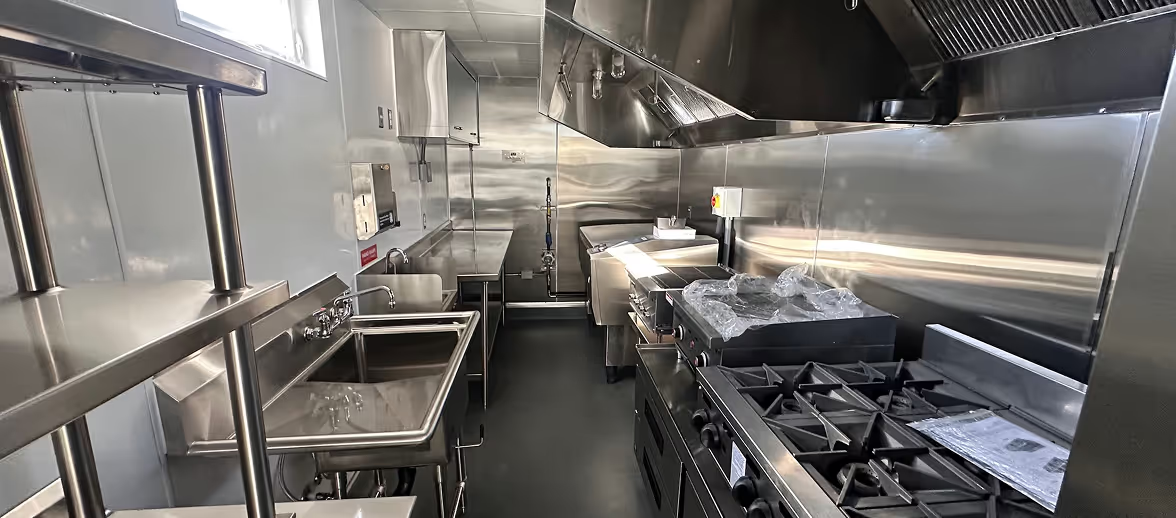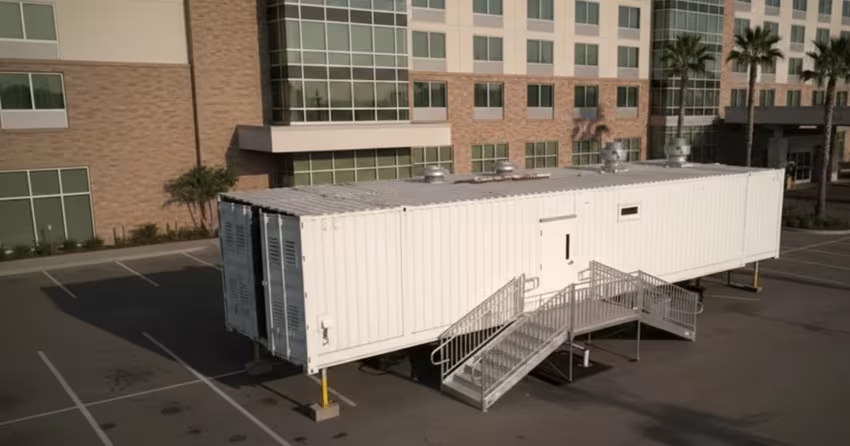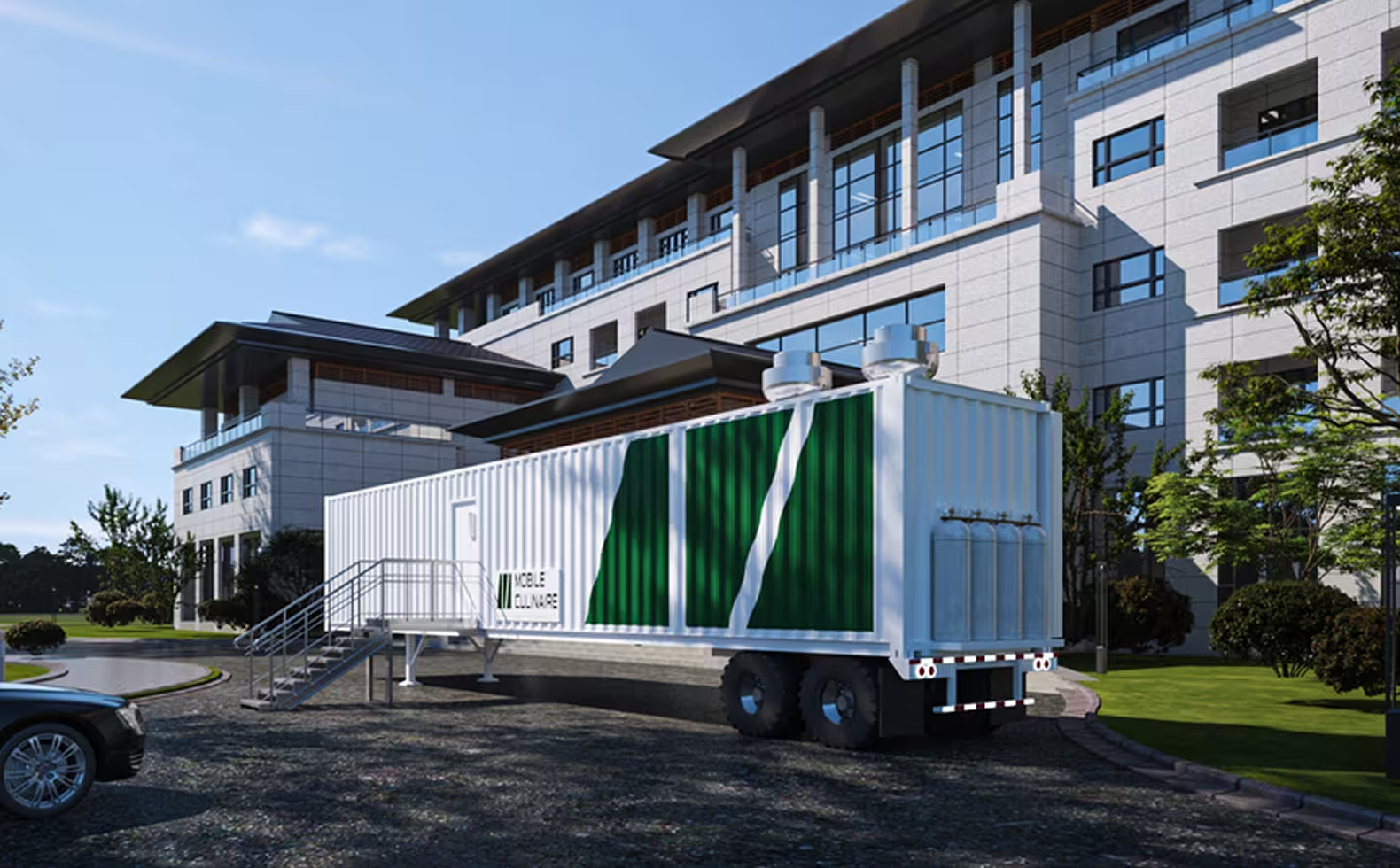.avif)
Introduction
California’s mobile food scene is booming — from Napa Valley winery events and SoCal festivals to Bay Area stadium concessions. But so are the compliance demands. Unlike New York’s centralized system, California delegates oversight to county environmental health agencies that enforce the California Retail Food Code (CalCode), while local fire marshals apply the California Fire Code (CFC) §319 for mobile food preparation vehicles, and the DMV regulates road safety under the California Vehicle Code.
Miss even one requirement whether it’s commissary documentation, hood and suppression tags, LPG cylinder mounting, or trailer brake standards and your mobile kitchen trailer could face costly delays or outright denial.
In California, every kitchen trailer (legally a Mobile Food Facility (MFF) under CalCode) must pass both a DMV safety inspection and a county health department inspection before operation. With over 40,000 registered food trucks, trailers, and carts across the state (California Department of Public Health), competition is fierce, and compliance is non-negotiable.
This blog provides a California-specific kitchen trailer inspection checklist, breaking down every step, from DMV mechanical standards and CalCode health requirements to fire safety certifications and local permitting details. Use it to prepare, pass inspections, and launch your kitchen trailer quickly and confidently.
Understanding Kitchen Trailer Regulations in California
Why California Enforces Strict Food Safety Rules
California’s mobile food sector operates year-round — from Los Angeles street fairs to San Diego beach festivals and Napa Valley wineries. These high-density, high-volume environments increase the risk of foodborne illness, propane-related fires, and sanitation failures if trailers aren’t properly designed or maintained.
To manage these risks, the California Retail Food Code (CalCode, Health & Safety Code §§113700–114437) establishes statewide standards for all Mobile Food Facilities (MFFs) — including kitchen trailers, food trucks, and carts. CalCode governs everything from hygiene and plumbing to construction materials, ventilation, and wastewater systems, ensuring consistent food safety no matter the county.
Complying with CalCode not only prevents penalties and operational delays but also builds customer trust — a vital advantage in one of the nation’s most heavily regulated mobile food markets.
Agencies Responsible for Kitchen Trailer Permits & Inspections
California’s inspection system involves multiple agencies working in tandem to ensure both food safety and mechanical compliance.
California Department of Public Health (CDPH)
- Oversees CalCode’s statewide implementation and provides technical guidance through its Food and Drug Branch (FDB).
- Coordinates with county health departments to ensure mobile food facilities meet design, sanitation, and operational standards.
County Environmental Health Departments
- Each county — including Los Angeles, San Diego, Orange, and Alameda — handles plan review, operating permits, commissary approvals, and routine field inspections.
- County inspectors ensure every mobile kitchen trailer meets CalCode health and sanitation standards before and during operation.
- Example: Los Angeles County’s MFF Plan-Check Program requires pre-approval of trailer layouts, equipment lists, and waste systems.
California Department of Motor Vehicles (DMV)
- Enforces mechanical and road safety requirements for trailers under the California Vehicle Code (CVC).
- A DMV inspection verifies registration, braking systems (see CVC §26302), and overall roadworthiness before a trailer can operate legally.
California Office of the State Fire Marshal (OSFM) / Local Fire Marshals
- Enforces the California Fire Code (CFC) §319, covering hoods, fire suppression systems, LPG storage, and clearance distances for mobile food preparation vehicles.
- Local fire marshals may add regional amendments — such as San Francisco Fire Code §319 — to address local hazards.
.avif)
Kitchen Trailer Inspection Requirements Checklist (California)
Passing inspections in California requires kitchen trailers to meet CalCode, DMV, and Fire Marshal standards covering structure, sanitation, mechanical, utility, and fire safety systems.
1. Structural & Sanitation Standards
- Floors, walls, ceilings: Smooth, easily cleanable, and non-absorbent per CalCode §114271.
- Handwashing sink: Separate from warewashing sink; must supply hot water (≥100°F), soap, paper towels, and signage.
- Three-compartment sink: Required for warewashing unless the trailer only sells prepackaged foods.
- Water system: Potable, pressurized, and continuous; wastewater tank must be at least 15% larger than the freshwater tank (§114195).
- Lighting & ventilation: Sufficient illumination; hoods over grease-producing appliances required (§114149.1).
- Food contact surfaces: Non-toxic, corrosion-resistant, and NSF-certified.
2. Food Trailer Equipment Compliance
- NSF-certified appliances: All cooking and refrigeration equipment must bear NSF or equivalent certification (§114130).
- Temperature control:
- Cold holding ≤ 41°F
- Hot holding ≥ 135°F
- (per FDA Food Code standards adopted by CalCode).
- Ventilation & fire suppression:
- Commercial hood system required for fryers, grills, and ovens.
- UL-300 fire suppression system installed and tagged per California Fire Code §609.
- Generator or propane setups: Must include a gas shutoff valve and CO detector when enclosed.
3. Utility Systems & Safety
- Plumbing: Backflow prevention, indirect drains, and grease trap when required (§114190–114192).
- Electrical: Must meet NFPA 70 (NEC) standards; no frayed or exposed wiring.
- Propane/gas systems: Leak-free lines, secure cylinder mounts, and emergency shutoffs.
- Waste disposal: Proof of a commissary agreement for wastewater and grease disposal (§114295).
4. Fire & Safety Codes
- Class K fire extinguisher: Required in all cooking operations per CFC §906.4.
- UL-300 suppression system: Mandatory for fryers and griddles producing grease vapors.
- Hood & duct maintenance: Must be cleaned and serviced per NFPA 96.
- Emergency egress: Clear pathways and exits required for enclosed trailers.
- LPG storage: Cylinders mounted outside trailer; aggregate volume limits apply per CFC Table 6104.3.
5. Mechanical & DMV Safety Inspection (Trailer Chassis & Roadworthiness)
Before health inspection, trailers must pass a California DMV safety inspection.
- Chassis, frame & hitch: Structurally sound; no corrosion or weld damage.
- Brakes, axles & suspension: Functional and maintained.
- Tires & wheels: Proper tread depth, inflation, and bearing lubrication.
- Lights & reflectors: Functional headlights, brake lights, and turn signals.
- Couplers & safety chains: Dual safety chains; breakaway system for heavy units.
Tip: Inspectors may request proof of regular maintenance logs and temperature records. Keeping organized documentation improves approval odds during initial inspection.
%2520(1).avif)
Documentation, Permits & Insurance Requirements for Kitchen Trailers in California
1. Food Trailer Permit & Health Inspection
Each kitchen trailer must hold a valid Mobile Food Facility (MFF) permit issued by the county health department.
- Plans must include layout, plumbing, menu, and equipment list.
- Operators must have a commissary or mobile support unit (MSU) agreement.
- An Environmental Health Specialist will inspect for compliance with CalCode before approving the permit.
2. Insurance & Liability Coverage
Operators should maintain:
- General liability insurance – covers foodborne illness or injury.
- Commercial auto/trailer policy – required for DMV registration.
- Property & equipment insurance – protects interior and appliances.
3. Fire Department Inspection
Required for any trailer with cooking appliances. Standards include:
- UL-300 hood suppression system.
- Tagged Class K extinguisher.
- Proper propane storage and shutoff valves.
- Compliance with California Fire Code §609 and NFPA 96.
4. DMV Registration & Road Compliance
Trailers must be registered as commercial vehicles under the California DMV. Requirements include:
- VIN/title verification,
- Working brakes, reflectors, and couplers,
- Weight-class compliance,
- Annual DMV inspection.
5. Zoning & Location Permits
Counties and cities regulate where trailers may operate. Common restrictions include:
- Distance from schools, restaurants, or intersections,
- Noise and generator limits,
- Waste management and public seating requirements.
6. Temporary & Event Permits
Operators participating in festivals or fairs must secure temporary food facility (TFF) permits from the local Environmental Health Department. These often combine health, zoning, and fire safety reviews.
7. Waste Management & Environmental Compliance
Operators must maintain:
- Contracts with licensed waste haulers for grease and graywater,
- Commissary agreements for cleaning and water refilling,
- Onsite logs showing proper disposal practices.
.avif)
Streamline Inspections with Mobile Culinaire
Permitting delays, code violations, and retrofitting issues are common when building kitchen trailers from scratch. Mobile Culinaire eliminates these barriers by delivering inspection-ready units built to California standards.
Built from the Ground Up
Every Mobile Culinaire unit is designed and manufactured in-house, leveraging experience from 400+ kitchens nationwide. The result is smarter layouts, durable builds, and fewer points of failure — not a retrofit, but a purpose-built kitchen tested in real-world conditions.
Fully Equipped & Turnkey
Trailers arrive with commercial-grade appliances, UL-300 fire suppression, HVAC, plumbing, and lighting — ready for immediate inspection and operation.
Built to Pass Inspections
Mobile Culinaire kitchens are pre-engineered for health, fire, and mechanical compliance, helping operators pass Environmental Health and Fire Marshal inspections faster.
Expert Guidance & Regulatory Support
Our team understands the California permitting landscape, from county plan checks to fire code clearances, ensuring less red tape and fewer rejections.
Flexible Rentals & Full-Service Delivery
Whether you’re launching at a fair or bridging a renovation, Mobile Culinaire offers custom rental terms, delivery, setup, and breakdown — all from one point of contact.
%2520(1).avif)
Conclusion
Operating a kitchen trailer in California offers enormous opportunity but comes with some of the strictest food safety and inspection standards in the U.S. From CalCode compliance to DMV road checks and fire marshal reviews, each step requires planning, documentation, and precision.
By following the California kitchen trailer inspection checklist, operators can reduce costly rejections, stay compliant, and build confidence with local health departments.
With Mobile Culinaire, you get a compliant, inspection-ready trailer from day one — engineered to meet California’s toughest standards, helping you open faster and operate safely.
Ready to simplify your inspections? Contact Mobile Culinaire today to get your California-approved kitchen trailer delivered.
People Also Ask (FAQ)
What are the food trailer inspection requirements in California?
California requires kitchen trailers (Mobile Food Facilities) to pass both a DMV mechanical inspection and a county health inspection. Inspectors check for food safety compliance (handwashing sinks, potable water, temperature controls), structural integrity, and fire protection systems like UL-300 suppression and Class K extinguishers.
What equipment must a kitchen trailer have to pass inspection in California?
Trailers must include NSF-certified cooking and refrigeration equipment, a three-compartment sink, handwashing sink, and commercial hood with fire suppression. Surfaces must be cleanable, and tanks sized per CalCode (wastewater ≥15% larger than freshwater). Electrical and gas systems must meet NEC and Fire Code standards.
Do food trailers need a permit and license to operate in California?
Yes. Kitchen trailers must hold a Mobile Food Facility (MFF) health permit from the local Environmental Health Department, a valid DMV registration, and fire clearance. A commissary agreement is mandatory for cleaning, water, and waste disposal.
Testimonial

"What is standing out when you look at the mobile kitchen operation is the efficiency that we can really achieve because it's built for that."
Tell us about your kitchen needs and request a quote.
.png)
Turnkey mobile kitchen
.png)
Proudly made in-house in the USA
.png)
Commercial grade kitchen equipment
.png)
Code-compliant
Trusted by Industry Leaders




.gif)

%20(1)%20(1).avif)

